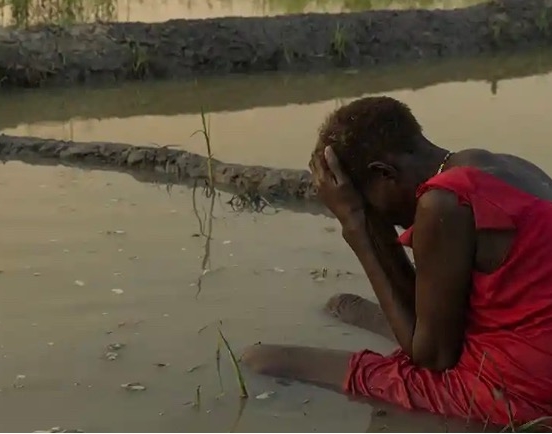Climate, Health and Equity Brief
Fires, floods, deserts and the U.S acts
January 18, 2022

The Climate, Health & Equity Brief is GMMB’s take on the week’s news on the current impacts of climate change. If you haven’t subscribed yet, you can do so by clicking here.
Hot Topic: Extremes. Several developments this week continue to illustrate the wide-ranging effects that climate change is having on every corner of the planet.
Wildfires made worse by climate-fueled heat and drought continue to exacerbate planetary heating by releasing record amounts of carbon as they burn. A new report found that wildfires across Siberia, the U.S. and Turkey emitted an estimated total of 1.76 billion tons of carbon in 2021—roughly the equivalent of 1.34 billion passenger cars being driven for an entire year.
In Africa, more than 700,000 South Sudanese people–or 1 in 15—have been displaced from their homes by record flooding this year. Cases of malaria and other waterborne illnesses have surged. And the floods have wiped out vast swaths of harvest land and killed nearly one thousand cattle, driving a massive hunger crisis in which more than 60 percent of the population is considered at a crisis-level risk of famine, according to the World Food Programme.
And in global regions ranging from remote Russia and northern China to North Africa and the American Southwest, desertification is slowly overtaking areas that are home to half a billion people. In these regions, higher temperatures and drought combine with human practices such as deforestation and over-farming to leave the soil lifeless, devoid of moisture or nutrients, and unable to sustain crops or even grow grass for livestock.
In a spot of good news, President Biden issued a series of executive orders this week that commit the federal government to achieving net-zero emissions by 2050, a transition that will be crucial to tackling the climate crisis. The orders set interim goals for the government to purchase only clean energy by 2030, cut building emissions in half by 2032, and purchase only zero-emission cars and trucks by 2035. Given the purchasing power of the U.S. government, observers are hopeful that a U.S. commitment to purchase cleaner products will help spur markets and accelerate the transition to green energy. It can’t come a moment too soon.
— Matt & Traci, GMMB
Human Health
Record flooding linked to climate change has displaced about 1 in 15 people—more than 700,000 in total—in South Sudan, worsening the hunger crisis in one the world’s poorest countries. (The Washington Post)
Researchers warn that warming waters are to blame for dangerously high levels of algae blooms in Alaska’s Arctic waters that are potentially fatal to people and marine wildlife. (Hakai Magazine)
Planetary Health
Wildfires this year in the U.S., Siberia and Turkey led to record-breaking levels of emissions, releasing 1.76 billion tons of stored carbon into the atmosphere. (CNBC)
Desertification is increasing worldwide in Northern China, North Africa, remote Russia and the American Southwest as climate change and resulting droughts fuel hot, dry conditions that leave the soil parched, lifeless and unsuitable for sustaining plant life. (The New York Times)
Two atmospheric rivers in Canada are responsible for a week of devastating floods that have damaged major transport routes, forced the evacuation of more than 800 farms and killed hundreds of thousands of farm animals. (Bloomberg)
We cannot continue to pollute the atmosphere, poison the ocean and exhaust the land. There isn’t any more available.” – Stephen Hawking
Equity
An investigation found that for the last six years, a Tampa lead factory located in a low-income region of the city has repeatedly discharged polluted water into the Palm River, sent chemicals into Tampa’s sewer system, mishandled hazardous waste, emitted toxic levels of lead, and deliberately misled officials by reducing emissions on days when regulators monitored air quality. (Tampa Bay Times)
Politics & Economy
A new UN report found that extreme weather combined with the effects of the pandemic drove global food prices to their highest level in 46 years and are expected to make the global food supply highly vulnerable to extreme weather in 2022. (Yale Climate Connection)
A new indestructible steel monolith designated as “Earth’s Black Box” installed in Australia will record all climate-related data past and present to preserve the story of the impacts of climate change for future civilizations. (CNN)
Action
In a series of executive orders, President Biden committed the federal government to net-zero emissions by 2050, setting interim goals for the government to purchase only clean energy by 2030 and for all new federal cars and trucks to be zero-emission vehicles by 2035. (The New York Times)
The city of San Francisco announced a new strategy to combat climate change, committing to net-zero emissions by 2040, using 100% renewable electricity by 2025 and ensuring all projects work in tandem with efforts to build up greater social and racial equity. (KRON 4)
Kicker
Check out this new in Google Earth Timelapse feature that shows you how climate change and other factors have altered the global landscape over the last 37 years.
The GMMB Climate, Health & Equity Brief would not be possible without the contributions of the larger GMMB California team—Aaron Benavides, Elke Cortes and Stefana Simonetto. Feedback on the Brief is welcome and encouraged and should be sent to CHandEBrief@gmmb.com.






